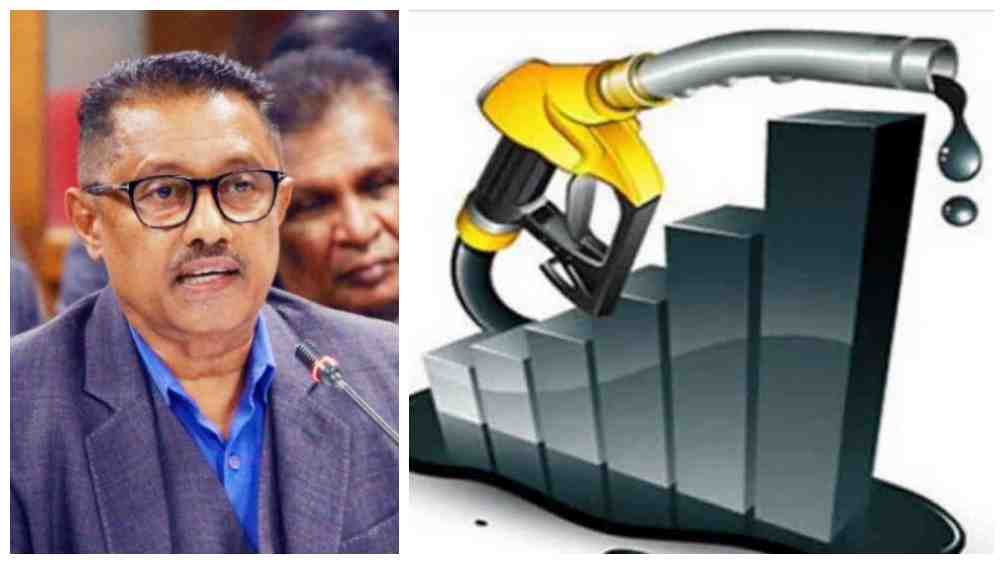
The Public Utilities Commission of Sri Lanka propose to implement a transparent pricing formula as the CEB incur unnecessary expenses in generating electricity due to the absence of a proper fuel price formula
The Public Utilities Commission of Sri Lanka’s Chairman Mr. Janaka Ratnayake emphasized that Sri Lanka should establish a transparent method to determine the fuel price which will enable people to see the real cost and its fairness. Mr. Ratnayake states that he has also submitted the related information to the Committee of Public Enterprises (COPE) in this regard. The price of a liter of fuel in Sri Lanka should further decrease in accordance with the actual prices in the world market. Mr. Ratnayake added that the data he presented earlier regarding the actual fuel prices is correct according to a news report published yesterday which has present same data by the Ministry of Finance.
“The price of petrol was reduced by 20 rupees last night. I had pointed out two weeks ago that the price of a liter of petrol and diesel can be reduced by 150 rupees. These facts were revealed based on the actual prices of fuel imported into Sri Lanka according to customs data. The officials of the petroleum industry have not yet revealed what are the true prices are. There should be a transparent system to determine the fuel price which impact largely to the economy of Sri Lanka. The reduction that came to effect on last night is not enough in accordance to current world market prices. The data that I presented regarding the fuel prices was further confirmed through another newspaper report published yesterday. According to the current market data and the actual prices paid by the Ceylon Petroleum Corporation for fuel import, the local price of a liter of fuel can be reduced by at least 100 rupees. Fuel price should be determined in a simple way based on reasonable costs. Also, the fuel price formula should be implemented with a proper time frame which will not lead the market irregularities to occur. The fuel price should not be decided on the basis of other objectives and without proper time frame.” Mr Ratnayake said.
Further Mr Ratnayake points out that fuel prices that are not based on reasonable costs have severely affected electricity tariffs.
“Electricity tariffs are determined through transparent methodology based on reasonable costs. All the costs from generation to distribution of electricity are made known to all stakeholders including the electricity consumer as well as the public. At present, 35% contribution is made from fuel plants for electricity generation. These power plants use all 3 types of fuel namely diesel, furnace and naphtha. About 3250 metric tons of fuel is spent daily to generate electricity, for continuous electricity supply. While determining electricity tariffs, we need to know whether we are paying a fair price for fuel. At present, a liter of crude oil is supplied to these power plants for 419 rupees. But if calculated according to the customs data, the price per liter should be 191 rupees. Accordingly, the power plants are charged an extra 228 rupees for every liter. Due to this, an additional burden of 270 billion rupees or 2700 crore rupees is imposed on electricity consumers annually. If fuel is supplied for power generation at fair prices, the impact of the proposed electricity tariff revision can be minimized.”
Currently, there is a downward trend in crude oil prices in the world market. In order to take advantage of this, crude oil can be continuously supplied to the country’s refineries and all fuel types required for electricity generation can be provided at the lowest prices. A price formula and price regulation with a transparent and scientific basis, such as the current tariff determination system for electricity, should be implemented immediately for fuel, Mr. Janaka Ratnayake emphasized.
The Public Utilities Commission of Sri Lanka has the power to fully regulate the electricity industry through the Sri Lanka Electricity Act. The Commission was appointed to regulate the petroleum industry in 2006. But the acts enabling PUCSL to regulate the industry have not yet been passed by the Parliament. Therefore, the Commission or any other regulatory body has no legal powers to intervene in the regulation of petroleum industry. I suggest that the responsibility of regulating the petroleum industry should be handed over to the Public Utilities Commission of Sri Lanka as soon as possible. With that, a transparent system for fuel prices can be implemented. The goals such as fuel price regulation, efficient distribution, higher service level and quality can be achieved through regulatory framework. Implementation of regulatory mechanism can ensure price stability in the electricity and transportation sector by providing fuel to the petroleum consumer as well as providing fuel for power plant at fair prices. (PUCSL)